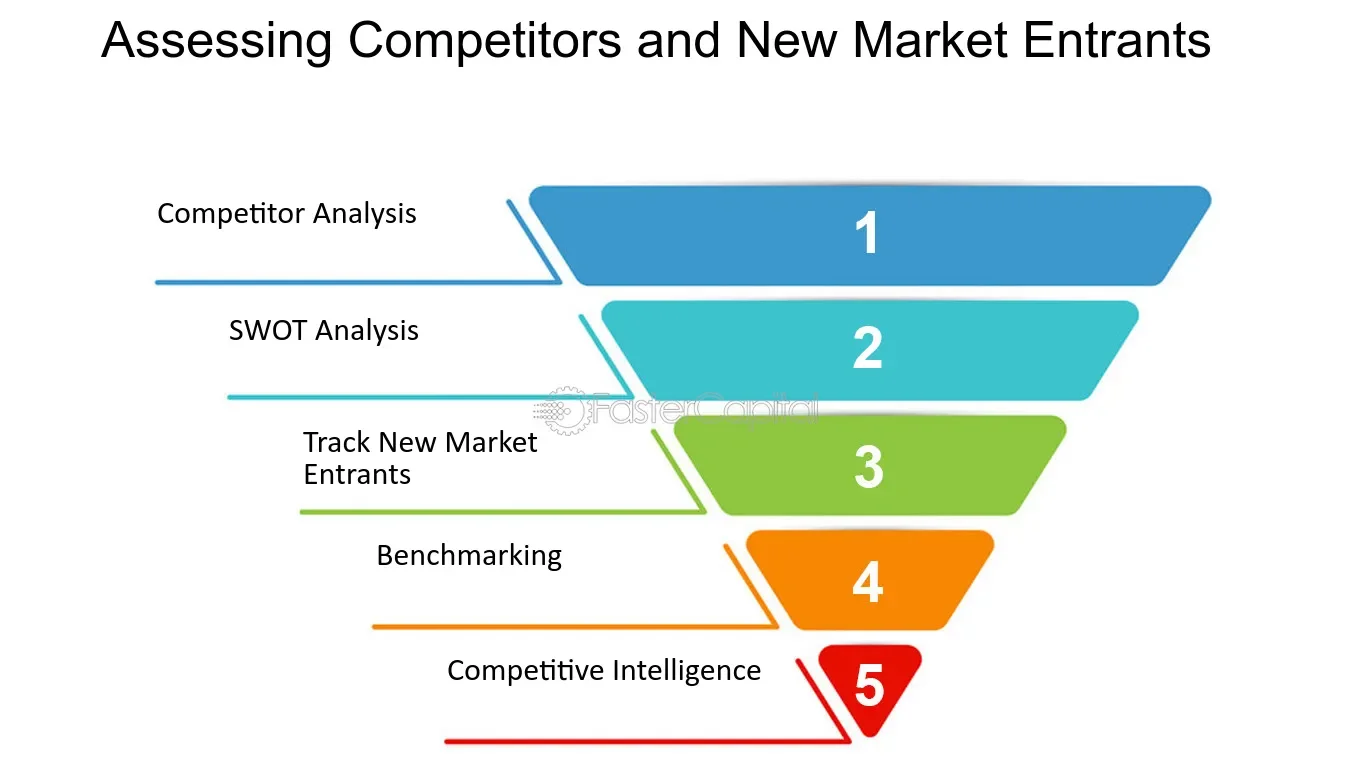Why Small Healthcare Businesses Should Do Competitive Analysis FIRST (and how to do it…)
Are you in the healthcare industry?
Have you invested in marketing?
But you’ve NEVER assessed your local competition?
Then I’d say, with 87% certainty…
You are WASTING your time and money…
Measuring your own company against your competition is one of the FIRST STEPS in forming your marketing strategy.
This is the reality, even in the healthcare world. And it’s not up for negotiation. Without it, the financial risks become enormous:
Your strategy? Aimless or misguided…
Your messaging? Redundant and invisible…
Your results? Mediocre or unsustainable.
If you are already convinced of this, and just need to know what to do, go ahead and jump to the second section of this blog post subtitled “How to Assess Your Competition”.
But before we dive right in, explaining what assessing your competition is and how to do it, I need to address what some readers might be thinking:
“I don’t like referring to my industry colleagues as ‘competitors’”
Other readers are a-ok with“beating” direct competitors. Usually, these health groups are in direct competition for contracts with government agencies or large businesses. Or they are going up against major health corporations that abandoned quality patient care decades ago. And in those circumstances, “competitor” feels right.
But others are uncomfortable with the word. Because with the word comes a certain perspective; it colors how you see other healthcare providers and business owners. And many clinicians don’t want to view good ol’ Dr. Johnson…
Who works down the road…
And whose kid goes to school with your kid…
And who you know cares about patients and does great work…
As some sort of “enemy” that needs to be beaten.
After all, you and other doctors and healthcare providers took the same oath. You are all on the same team. You have the same general goal: to make people healthier, overcome disease and illness, and create healthy communities.
And when there are more unhealthy people in our community than we know what to deal with, referring to “competitors” seems silly. After all, isn’t there PLENTY of health work to go around? To “compete” would be like fighting over sand at the beach… right?
And you know what? I get it.
When I worked in church ministry, we had the exact same qualms. There were tons of people that needed spiritual help (over 90% of our community in Southern California). Having the perspective of “competing” with other churches was missing the point. We shouldn’t be trying to pull people away from other churches… we should be trying to reach and attract new people!
This type of framing of the word “competition” conjures imagery of being antagonistic to other healthcare providers in your area. As though you are in conflict and trying to overcome or beat them so that they lose. But in a market where so many people need help, what is the point in using a word that implies winners and losers? Can’t we all be winners?
In a sense, yes! Which is why I suggest viewing the word “competitor” as simply “different option”. These are the options available to the people who need your health services the most. Your target audience has you as an option, but they also have other options. And those other options are your “competitors”.
Assessing competition = discovering patient options
But ok, there is nothing wrong with competitors/different options. But it begs the question: why even care? Why not just do your own thing? All that time you spend looking how others are doing, you could be focusing on doing great work!
True true true. But here’s the thing: your potential patients… that target audience… IS CHOOSING. They cannot afford to see all of you at once. They are picking just one of those options.
Your potential customers are assessing your competition
And while there are many excellent practices in your area with your level of expertise, I am sure you can think of a few people that you know, with 100% certainty, for whom YOU are the best fit. People who you believe in your heart of hearts would benefit most if they chose you.
Your marketing needs to grab their attention, resonate with their needs, and compel them to book an appointment. How do you do that?
By being DISTINCT.
Bottom line:
If you do not stand out…
Then fewer people will choose you,
Because fewer people will notice you
Yes, this means some people will consiously reject you. But that is way better than unconsiously rejecting you, and when this happens WAY more people will choose you than otherwise would have.
There are decades of proof and foolproof psychology behind this concept. If you want to learn more, just watch this lecture by master advertiser David Trott. It is kinda boring, but legendary.
But at the end of the day, if want to grow your practice, increase your case load, and get more patients… then you need to give your customers a reason to choose you and not someone else.
To be chosen, you need to stand out as distinct.
Whatever you offer, your target customers needs to perceive it as 1:1.
Your uniqueness is some combination of your:
Your prices
Your services
Your expertise
Your location
Your demeanor
Your availability
There are endless combinations. But you must find the combination that is ONLY YOURS.
If you are exactly like another healthcare provider in your area, then at least 50% of people who might choose you will choose them instead.
And what do you need to do to know that you are being distinct?
You need to assess what those “other options” (ie, competitors) are doing.
When you assess your competition, you are merely seeing what your target audience sees.
You are discovering what options are at their disposal so you can figure out how to best position yourself so you get noticed.
You need to differentiate yourself from your competition/the other options. And you cannot differentiate yourself unless you know what you are differentiating from.
To summarize…
Why is it important to assess your competition before creating your marketing strategy?
Because you need to give your target audience a reason to choose you instead of someone else. When you assess your competition first, you avoid wasting time on unnoticeable messaging and instead discover a place in your local market that can be uniquely yours. That way, when your target audience looks for help, they will notice you, trust you, and choose you.
image is not property of Riley James Copy
How to Assess Your Competition
Finally (or instantly if you skipped down here), we get to talking about HOW you assess your competition.
Fortunately, the actual assessment is much more straightforward. Furthermore, assessing local competition in healthcare is no different than assessing local competition in any industry. It’s just market research.
Healthcare agencies will use fancy phrases like “Conducting Local Market Analysis for Private and Group Practices”. They use these terms to make themselves sound impressive and professional. They might even use a chart like the picture above. They want to make the process sound as sophisticated as possible so that A) they can impress other healthcare marketing agencies and B) intimidate you into choosing them NOW.
Let’s dispel their mystique with some simple definitions of their industry jargon:
“Competitive Landscape”: the options your customers have, how serious they are, and what they are doing to get customers.
“Target Market”: the broad group of customers you want to attrack.
Benchmarks:
“Market Share”: the percentage of the target market that you call customers.
“Competitive Advantage”: ways you provide healthcare and market better than the other options.
“Market Presence”: how visible or influential you are, both in the community and among your colleagues
“Indirect Competitors”: anyone who is not in healthcare, but meets the same patient needs that you do.
If they are down-to-earth folks, they might say something like “SWOT Analysis”, which simply stands for assessing the strengths, weaknesses, opportunities, and threats from your direct competitors. But in my opinion, even this isn’t very helpful for a small business. It’s too broad and general.
But assessing your competition really is as simple as the following:
Make a list of businesses that would serve your ideal patients in your area
Look at what they say (words) and show (images/video/colors)
Notice HOW they say or show it
Notice what they DO NOT say or show
Notice WHO they seem to be speaking to
Check their pricing (if possible)
Look at reviews and what customers say about the
Visit sites like Reddit and see if anyone in your area is complaining about a lack of (insert your particular service here).
THAT’S IT.
No shady marketing tactics.
No complicated survey of the market landscape.
No corporate espionage involved.
No graphs, templates, or product features.
No official certifications or
No packet on industry trends.
No backalley takedown.
No scathing attack ad needed.
This is the extent of necessary competitor analysis.
When you are assessing competition, your goal is not to undermine them or run them out of business. You are looking for A) lack of customer satisfaction, B) how your own company can better provide those services, and C) how you can communicate your value in a way that stands out.
You are identifying unmet needs of your community so that you can figure out where you fit in the market and what you can do to stand out and show your unique excellence.
And while healthcare marketers (like myself!) do have an eye for this stuff, that is all you need. You don’t need complicated algorithms or endless stat sheets. Just time and a discerning eye.
But what do you do with that information?
Communicate something different in ways they don’t.
Say something about yourself that no one else is saying
Say it in a way that is different from how they say it.
How do you do that?
Well, that is a whooooole other ball game, and the primary service I offer my clients :)
“There is some time left for some questions…”
What are the common mistakes to avoid when assessing competition in a business plan?
Focusing too much on social media. Followers are cheap and easy.
Making your analysis look like a PowerPoint presentation. Unless you have some board to present, you can do this on a legal pad. No competitive analysis report needed.
Overemphasizing sales tactics and business strategy. Unless you only have one or two competitors, they are likely doing all the same things you will be doing. What matters more is brand messaging
Skipping customer testimonials and reviews. Nothing is better than this. Pay attention to whether or not your competition responds to the comments.
Picking the wrong success metrics. If you measure success the wrong way, then you’ll never reach your goals.
How often should a small healthcare business reevaluate its competition, and what signs indicate it’s time to reassess?
Unless you hear about a new, similar practice opening up, a small healthcare business only needs to re-assess its competition once a year. Of course, if you have a marketing team, you could benefit from repeatedly reevaluating. But time and money constraints make this unfeasible for most small healthcare practices.
What tools and frameworks are most useful for conducting a comprehensive competitive analysis?
So if you reeeeeeaaally want to go in depth with your healthcare market research, you can use the following platforms:
Ahrefs: all-in-one SEO toolset used to analyze websites, track rankings, and research competitors.
Google Analytics: a tool that tracks and reports website traffic and user behavior.
Linkedin: sometimes you can see how many employees they have, and whether or not they have a dedicated marketing tea
Which metrics should I focus on when comparing my business to my competitors?
Keyword rankings:
Site Traffic:
CPL (cost per lead):


